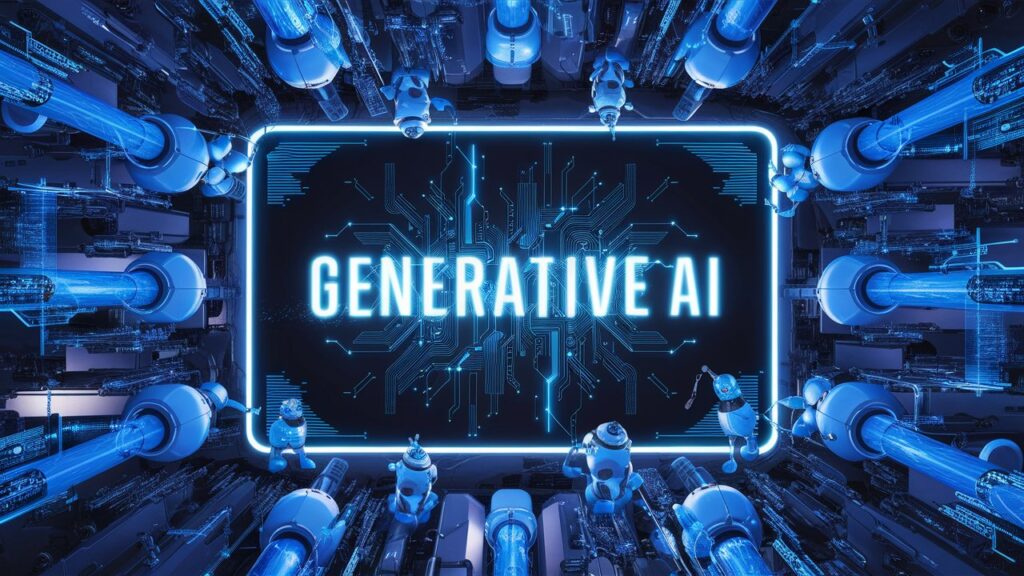
What Is Generative AI?
Generative AI in search is making use of Artificial Intelligence to improve the experience of users using search engines. Through AI for search users are able to do everything from creating images to receiving assistance in writing. Search engines employ AI to assist users in gaining deeper insights into topics and to process information more efficiently.
AI That Creates Content
Contrary to conventional AI that analyzes or categorizes existing data, Generative AI actually creates data from scratch. Examples of the generative AI include:
- AI which creates natural sounding texts, such as review articles on products or news stories. These systems can create written material that appears as if that it was written by human beings.
- AI that creates photo-realistic images such as images of humans and animals, as well as landscapes, etc. These systems are remarkably adept at synthesizing new images.
- AI that produces speeches as well as music, videos, and other content in a specific style. These systems mimic the fashion of a genre or artist, time frame and more. and produce entirely new content that follows the same fashion.
How Generative AI Works
Generative AI is a method of analyzing massive data sets of content such as images, text, music etc. and then recognizing patterns and styles in the data. The AI will then use the information it’s learned to produce fresh examples that adhere to the same patterns.
The most promising innovative AI methods are GANs, which are generative adversarial networks and variable autoencoders. These sophisticated neural networks are able to produce stunningly real-looking artificial data. Generative AI is extremely powerful however, it also comes with risks and challenges that scientists are currently working on to solve.
In the end Generative AI is an exciting area which is producing innovative and useful new forms of AI. As technology advances it is expected to have a major impact on many fields.
How Generative AI Is Transforming Search
Businesses are striving to enhance their search results Generative AI is being touted as an important major game-changer. Generative AI makes use of machine learning to create new content, including images, videos, text as well as audio. For search it’s able to generate synonyms, as well as related queries, as well as samples of content to aid users in explaining what they are looking for.
Generating Sample Content
For certain types of searches, especially broad or open-ended ones examples of content can assist users find inspiration or understand the subject. Generative AI is able to generate short snippets of videos, text or images in response to the question. For instance, if you look up “vacation outfit ideas,” Generative AI might create a few examples of pictures and descriptions of outfits to inspire your imagination.
Improving Search Relevance
By creating synonyms, similar queries, and examples of content Artificial Intelligence helps searchers get the information they require even if the initial query wasn’t precisely constructed. It offers search engines more information to discern the search intent and improve relevancy. As time passes, and AI becomes generative AI absorbs more data, the generated content will become more useful.
Google AI search A brief overview
Google has invested a lot of money in artificial intelligence, which is used to enhance the quality of search results. Their systems employ the machine-learning process and also natural processing of languages to better comprehend the queries of users and deliver appropriate results.
Semantic understanding
Google’s AI models look at the semantics of words and relationships between the words you search terms. If you’re searching for something that’s similar to “big cities in the US”, Google knows you’re seeking major cities within the nation. It may remove smaller villages and towns.
Natural processing of language
Google’s AI has been trained using billions of instances of natural language in order to understand the complexity and nuance of human conversation. Therefore, when you type an inquiry such as “What’s the best way to remove a wine stain? “, Google understands you’re looking for a practical solution instead of a simple definition. It will provide step-by-step guidelines and suggestions.
Personalization
Google AI tracks your search past and your interactions to build your profile to create a customized. If you type in “restaurants near me”, Google recognizes your preferences and location to customize the results. The more you utilize Google services and services, the more Google knows about you and can deliver relevant results from searches and also personalised advertisements and content on other platforms, such as YouTube or Gmail.
Image recognition
Google’s AI utilizes machine learning models that have been trained using millions of pictures in order to visually assess and identify images. When you upload or search for images, Google can identify objects such as scenes, logos, landmarks, and so on. Then, Google gives relevant results for your search, as well as information and suggestions in relation to what’s shown in the photos. Image recognition is the basis for features such as Google Lens, Google Photos as well as Google Image Search.
The Future of Search With Generative AI
The way we search is changing rapidly due advances in Generative AI. Generative AI makes use of machine learning to generate new content, such as images speech, video, and texts that are modeled on real-world data. In search Generative AI can produce similar queries and synonyms that better match what users are searching for.
Personalized Results
Generative AI can allow search engines to deliver highly customized results that are specific to the individual. Based on your history of searches, your locations, and other aspects such as location, generative AI will suggest similar results and search terms that are tailored towards your preferences and needs. For example, if often search for information about gardening or gardening, a search engine may give you suggestions based on your preferences for the varieties of plants and gardening tips as well as local gardening events and many more.
Expanding Knowledge Graphs
Knowledge graphs include details and connections regarding people, places and objects. Generative AI can aid in expanding knowledge graphs through the creation of new facts that connect entities. For example, if the knowledge graph includes information about writers and the books they wrote and books. Generative AI might provide new books or authors closely related to those already within the graph. The expanded knowledge graphs allow search engines to give more detailed and comprehensive answers to your queries.
Continuous Learning
With the access to massive datasets and massive datasets, the generative AI models are able to continue learning and advancing with time. As more people conduct searches, browse more results, and give feedback to generative AI, it will get a better grasp of how it can generate the most relevant search terms, synonyms and outcomes. This loop of continuous learning will allow search to become a more customized and awe-inspiring experience.
FAQ
What is Generative AI and how is it used in search engines?
Generative AI in search is making use of Artificial Intelligence to enhance user experience on search engines. It assists in tasks such as creating images, writing text, and offering help with writing to users. With the help of AI algorithms, search engines can help users gain more insight into their surroundings and make information easier to process.
What are some instances of Generative AI-related applications?
Generative AI creates reviews news stories, photos-realistic pictures of animals and humans as well as speeches, landscapes videos, music and other media in a variety of styles. These systems emulate the style of a particular genre artist or frame to create new content.
How does Generative AI work?
Generative AI examines huge amounts of information like images, text and music to discover trends and patterns. It uses this data to create new instances that follow the same pattern. Innovative techniques such as the generative adversarial network (GANs) as well as variable autoencoders are employed to generate real-time artificial data.

I am Ray Jones Digital
My current occupations: a Digital Marketer, Local SEO expert, Link Builder, and WordPress SEO specialist. Shopify SEO, Ecommerce Store Management, and HTML & WordPress Developer I have been practicing the above mentioned services for more than 10 years now As an SEO expert working with your ongoing projects.



